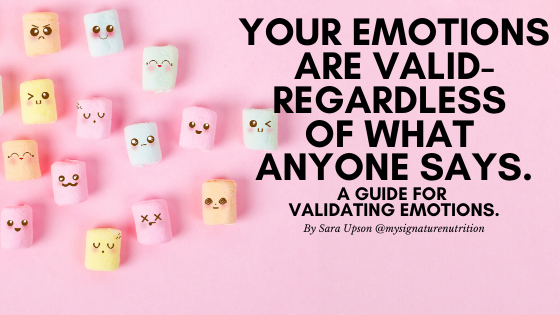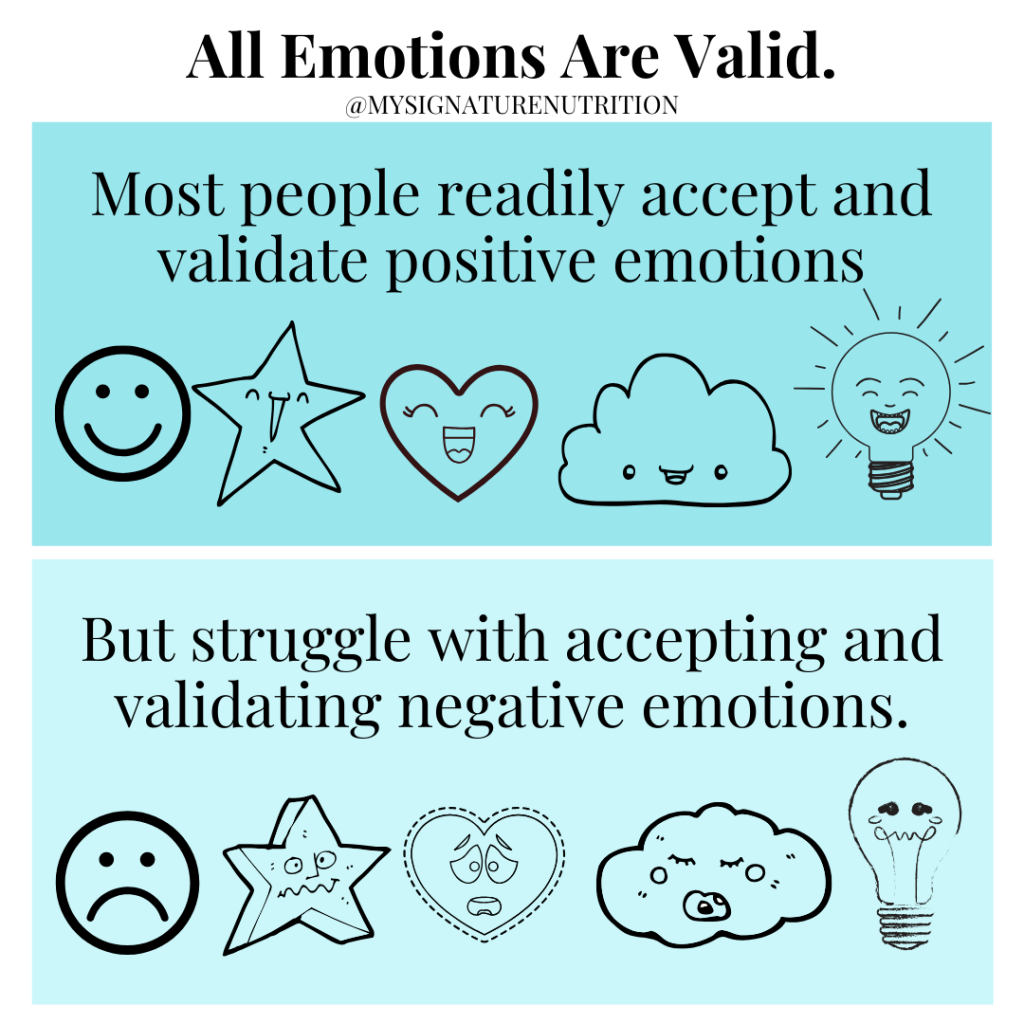Your Emotions Are Valid- Regardless of what anyone says.
March 16th, 2020 by Sara Upson

It’s national nutrition month and I’ve had blogs planned (even written) about various nutrition related topics but with the Coronavirus (COVID-19) taking over the world and our country it seems insignificant to write about nutrition- or really much of anything.
On the other hand, I also know that the eating disorder and diet culture don’t stop, that you’re suffering, and that the stress of the coronavirus and the ongoing unknowns are a trigger to trauma, anxiety, stress, and disordered eating. And it makes sense. It’s a scary time. So much can happen in the unknown and your brain certainly likes to remind you of that. Having increased thoughts, urges, and behaviors would be completely normal during this time. (Please make sure that you’re taking care of yourself and reaching out for support.)
Lack of validation from friends, family and loved ones is concern I’ve seen come up during this time (and really all the time). It’s often very triggering, can lead to eating disorder behaviors, and makes recovery or healing your relationship with food harder.
Just this week I’ve had clients express concerns about getting sick or a loved one getting sick to a parent or friend and were told completely invalidating responses: “stop being so sensitive,” “there’s nothing to worry about,” “you don’t need to be anxious,” “it’s not a big deal” or something along those lines. It’s very similar responses to what I hear on a weekly basis when clients express eating or body image concerns usually with that same group of people (typically parents, friends, family members, loved ones, or even within yourself). It’s so invalidating and it’s harmful.
Validation is “recognition or affirmation that a person or their feelings are valid or worthwhile” per the Oxford dictionary. Validating an emotion or experience is a way of communicating acceptance to yourself or someone else.

You can validate an emotion but not agree with the situation or even fully understand it– and that’s okay. For example, when my three year old is frustrated that his younger brother takes away his toy and then hits him, I can validate with my three year old that he’s frustrated that his toy was taken away, that he doesn’t like it when that happens, that it makes him angry, while at the same time make it known that hitting is not okay.
In diet culture or eating disorder recovery an example could be you or your child struggling to increase intake or include a new food that’s scary. You (or your child) might think or say, desserts are bad, I can’t eat them, and even cry or be upset. You can validate that desserts feel scary, that it’s hard to do something new or different, and that it’s okay to be upset, while also reinforcing that you/they must have the food to move forward with recovery.

There are many ways to provide validation, and a basic overview includes: labeling the emotion and then reflecting what you hear in a manner that is nonjudgmental and accepting.
Most people readily accept and validate positive emotions but struggle with accepting and validating negative emotions (thanks to the positive vibes only message of diet culture). The reality is- you have more negative emotions than positive and all emotions are welcome.

The desire to push negative emotions away and make them disappear as quick as possible or even not exist at all is normal- but not helpful. Not helpful in honoring your emotions, establishing relationships, or in healing your relationship with food.
To learn about validation- let’s first look at invalidation. Invalidation is when you minimize, deny, or invalidate someone’s thoughts or feelings. Consider the following scenarios, try to imagine how you would feel with the invalidating responses.
| Coronavirus: Invalidating Responses | Diet Culture/ ED Recovery: Invalidating Responses |
| You say: “I’m so worried about my grandmother getting sick.” | You say: “I had too much to eat and I feel sick.” |
| Denying- There’s no need to worry. Your grandmother’s tough and she’ll be fine. | Denying- You shouldn’t feel that way, you followed your meal plan. |
| Fixing- Stop worrying so much, you should go outside and get in the fresh air so that you can clear your head. | Fixing-Stop worrying. Next time you just need to eat a little bit less food, listen to your body better, put your fork down and breathe. That way you’ll be able to reconnect. |
| Philosophical- We all die at some point, there’s no need to worry. | -Focusing on how bad you feel just makes you feel worse. |
| Comparing-I’m not worried about your grandmother so you shouldn’t be worried either. | Comparing– Your cousin struggled with her eating and she never complained of being overfull. She just did whatever she had to do to move forward. |
| Questioning- Did you take your medicine today? Have you talked to your therapist? Did you journal or practice coping skills? | Questioning -What did you have to eat? Do you think you’re coming down with something? Did you check in with your emotions before eating? Did you eat earlier? |
| Minimizing– More people die each year from the flu and you weren’t worried about that. | Minimizing- That’s just part of the recovery process. |
| Judging– That’s dumb to worry about that. | Judging-I don’t even know how you feel that way (while rolling eyes). |
Now imagine if you someone told you one of those responses. How would you feel? Angry, upset, hurt, unheard, frustrated, alone, ashamed, like your feelings are wrong, like you’re wrong? Of course you do, these statements are completely invalidating and harmful. Yet, it’s what so many of my clients hear all the time, what you likely say to yourself, and honestly something we’re all guilty of saying at some point (we’re human, after all).

The goal with validation is to honor that emotional response for yourself or someone else. Consider these responses instead:
“You really care about your grandmother and you’re worried something will happen to her.”
“You feel guilty, like you’ve done something wrong and your stomach hurts.”
The goal is to label the emotion to communicate that you identify what the other person (or yourself is feeling). If the emotion(s) you label is incorrect the other person, or even yourself, can then correct the emotion or reasoning.

With validation, you feel relieved, heard, understood, better, hopeful and connected. Validation is a powerful tool in helping to calm your brain, reduce the intensity of emotions, allowing emotions to pass quicker, an integral part of self compassion, and important within relationships.
In summary, to validate, label the emotion and reflect what you hear. Allow time for yourself or the other person to correct any part(s) that were/are wrong. Listen! Try to understand their (or your) perspective. Resist the urge to correct, fix, minimize or any other form of invalidation.
Validation is a skill and it’s one that you can learn. Like any new skill it will feel wrong, weird, fake, maybe even annoying at first. The more you do it and practice it, the more natural it will feel- both for yourself internally and with other people. You can even validate with yourself how it feels to validate,” validating is so annoying, I just don’t understand it yet and feel vulnerable (weird, fake, ashamed) doing it.”
The more you practice doing it, the easier it becomes. And, I think you’ll be surprised with the how much better you feel and with how others react with you.
Comments are closed.





